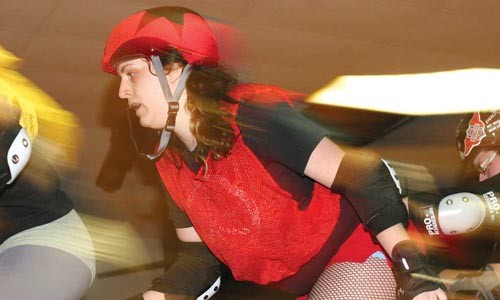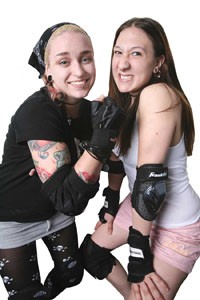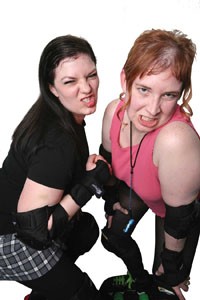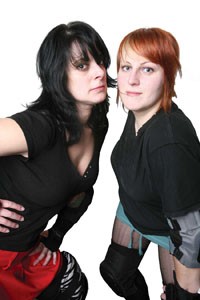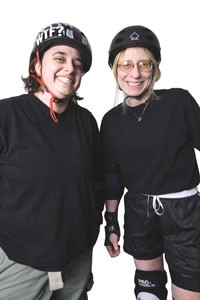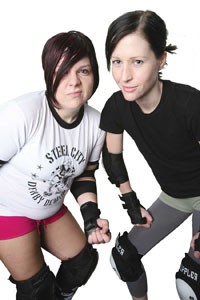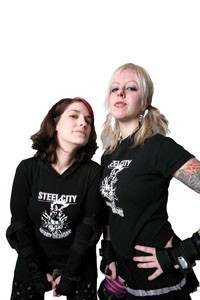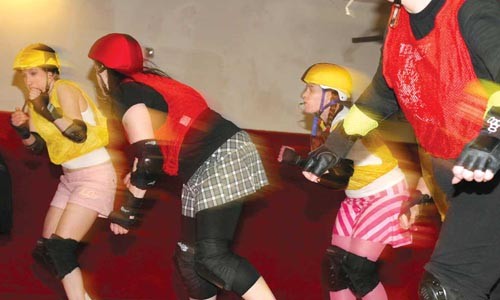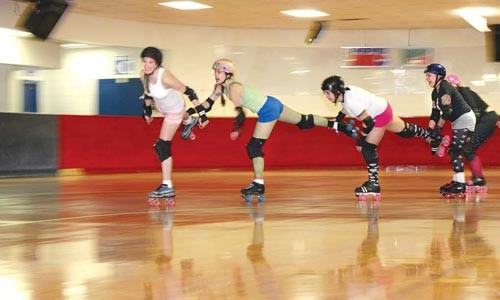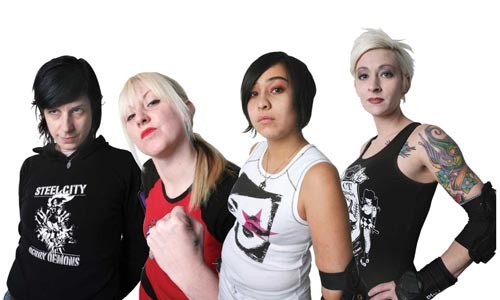
On a Sunday afternoon in early December, at the Romp n Roll skating rink in Glenshaw, the last stragglers from a third-grade birthday party are being ushered off the rink to the tune of "Have Yourself a Merry Little Christmas." The disco lights switch off and the overheads come on. And the atmosphere changes completely.
The Steel City Derby Demons, Pittsburgh's all-female roller-derby league, are over by the concession stand, holding their first round of interviews for the "fresh meat squad."
The dozen or so rookies who've shown up range in age from early 20s to late 30s. Some are already dressed to fit what's come to be perceived as the new derby-girl image: short skirts, fishnets, pigtails and tube socks. Others are in jeans, attire that will prove difficult to skate in when they eventually take to the rink. All are enlisting in one of the year-old league's four teams: the Hot Metal Hellions, the Bitch Doctors, the Slumber Party Slashers and the Wrecking Dolls.
At the moment, the Demons are talking to each girl individually, asking some basic questions: Do you have any prior athletic experience? Are you able to pay the monthly league dues? Do you have a history of fighting or violent behavior?
Most rookies say no to the last question, or say they can be violent when they have to defend themselves. League organizers have to be careful not to recruit bullies or bruisers, because the level of aggression roller derby demands must be controlled. This is a sport, after all, in which matches are routinely referred to as "bouts."
Meanwhile, some of the fathers who've arrived to pick up their children appear to be taking their time leaving. They watch as the women head to the rink to start the physical part of the tryouts.
Lindsey Waltenbaugh, a.k.a. "Damage Dahl," team captain for the Slumber Party Slashers, is circling the rink already. She's clad in a hard helmet, elbow and kneepads and wrist guards, a mouth guard dangling from her chinstrap. She skates by in a blur of long blonde hair and red lipstick, tattoos peeking out from under short shorts and a tank top. Waltenbaugh has been involved with derby only since last January -- and like most of the participants, she had only limited skating experience beforehand. But that's enough to make her one of the league's veterans.
"So what do you girls do?" one of the fathers asks. "Just, like, skate around?"
Not quite. They also get pushed into, knocked over and shoved off the track. They get sprained ankles, bruised elbows and dislocated shoulders.
Roller derby's rules are covered in a thick rulebook. Its players are covered by specialized insurance. But across the country, the sport has undergone a revival since its heyday in the 1950s and '60s. Roller derby's popularity has exploded in the past few years, partially because of reality television, but also because of players who are willing to take the risk.
Pittsburgh is a latecomer: The Demons have just recently qualified as an officially sanctioned league, and they're due to hold their first-ever exhibition bout on Jan. 27, at BladeRunners in Harmarville. But like nearly every league that's sprouted up in the past few years, the Demons have been organized and operated by the skaters themselves. Along the way, they've had to learn the rules and the ropes, and they've faced some of their biggest challenges outside of the rink. Not least among those difficulties: a widespread conception of roller derby as a passing fad, an ironic novelty ... or simply a means of watching chicks duke it out in short skirts.
But playing roller derby, like starting a league from scratch, comes with some bumps and bruises. Embracing them is part of the point.
In fact, the captain of the Hot Metal Hellions, Christine "Twiggy Stardust" Korekach, is herself sidelined for the moment. Having sustained a leg injury during last week's practice, she's in the corner on crutches while her teammates are out scrimmaging. She screams at her players as they pass by: "Come on! Shove her like you mean it!"
"When I do fall, I catch myself laughing on the way down," says Korekach. "It hurts when you get on the floor, but on the way down, I'm cracking up."
Roller derby wasn't always such a heavy contact sport, nor was it originally played by women only. It was invented in the 1930s by Leo Seltzer, who created it as a sort of fast-paced endurance race, in which two-person teams circled a rink thousands of times for over 10 hours a day, covering roughly the distance between Los Angeles and New York City. Later, Seltzer realized that spectators really enjoyed it when skaters accidentally collided with each other. And so he tweaked roller derby into more of a challenge between defense and offense, and did away with the marathon part.
These days, the rules are more detailed, but the object is simple. In each bout, two teams compete, each with a "jammer" who scores points for her team by passing as many opponents as possible. Opponents try to prevent this by blocking jammers from getting through. (Grabbing, tripping and hair-pulling are strictly off limits, and several referees monitor the action.) "Pivots" lead the teams and determine the speed of the race, acting as their team's final defense once a jammer breaks through the rest of the pack behind them.
By the 1950s, derby was a popular coed sport, with a handful of professional leagues touring across the country, competing before stadium crowds. Once matches were televised, derby evolved into a sport much like professional wrestling: a flashy spectacle of dramatized bouts, often including pre-scripted fights and staged rivalries. Though women made up just over half the players, derby was one of the few sports where female athletes loomed larger than men, notes Five Strides on the Banked Track, written by Frank Deford in 1971. The women were known for some dirty tricks, like grabbing an opponent's jersey zipper and pulling it down, or twisting it into her breast -- tactics that were big crowd-pleasers. The 1972 film Kansas City Bomber, starring Raquel Welch, also popularized the drama and violence in the sport.
But by the late 1970s, roller derby's fan base had dwindled significantly. The sport was taken off the air and out of the public eye.
That was the situation until 2001, when a group of women from Austin, Texas, known as the TXRD Lonestar Rollergirls, began reinventing derby's image.
Over the past five years, new leagues have been sprouting up around the country, no doubt partially due to the response in Austin and on myriad Web sites, message boards and online communities that carried the buzz. But since the airing, last year, of A&E's reality show Rollergirls, which profiled the Austin derbies, the number of start-up leagues has more than doubled. The Women's Flat Track Derby Association, or WFTDA, now has more than 40 member leagues ... and that's not counting the estimated 100 unofficial leagues out there, according to www.derbyroster.com.
"It sounds hokey, but I'll tell you the truth," says Pam Simmons, a.k.a. "Suzy Sydal," a member of the Bitch Doctors and one of the Pittsburgh league's founders. "I watched the first episode of that Rollergirls show and thought, 'This looks really cool!'"
Simmons, who plays guitar for local band The Motorpsychos, was attracted to the sport's image and aggressive nature.
"It's the same thing with my band," she says. "I think I'm attracted to things that women can do that are maybe more aggressive than typical women things. But I still like to look cute."
Along with friends Natalie "Busty Brawler" Gilchrest and Becky "Elsa Slamchester" Bauer, Simmons started posting on the Internet and flyering around town to see what kind of interest they could garner.
The first step was getting enough women to participate, and that came easily. When the Demons held their initial meet-up at the Upstage last January, about 30 aspiring players showed up. Within a month, as the league began collecting fees and insurance applications, the number had grown to 75.
The next step was getting the league rolling. And that has proven to take a great amount of dedication.
There are two two-hour-long league practices a week -- both on weeknights -- and at least one practice for each team in between. That's a huge commitment for someone like Korekach, a graphic designer and mother who has to manage her time between family, work and derby. She admits it's a struggle: Like most women in the league, she has at least one day job and a full schedule.
"Since my son turned 4, I kind of felt like I could do the derby thing because I don't have to be there constantly anymore, so it's kind of like getting my life back a little bit, and breaking the traditional mom role," she says. "I am a strong independent person who wants it all." Still, she says, "Balancing it, now since I've been a captain -- that's a huge juggle."
"I don't know how I functioned before," says Simmons, who works as a product development manager for a Web portal by day and is also a mother, in addition to her musical career. "I watched a lot more TV, I think. And I relaxed more."
On top of that, there's the league's charity work, its organizational tasks -- and coming up with tricks and strategies to prepare the team for its first bout.
Many of the women who participate don't have much, if any, athletic experience, and there's a huge range in background, age and lifestyle. The Demons will consider anyone from the age of 21 "'till you're dead." Members hold jobs ranging from bartender and business owner to schoolteacher and dental hygienist.
What they share is a passion for the sport, and the sisterhood that comes with it. "I thought this was a great idea to meet people and practice a sport," says Dubraska "La Diabla" Sosa, the Wrecking Dolls' team captain. "Roller derby is my family now."
Because none of the players had skated much since childhood, they had to become reacquainted with their skates before learning the rules of the game. "A lot of girls hadn't skated since junior high, but, I thought, 'Well, I'm the shit' because I had spent time Rollerblading on the Jail Trail in recent years," says Simmons. "When I ventured onto the rink, I was humbled ... big time."
The training regimen is demanding, as anyone who's watched a Demons practice can attest.
The women warm up with a set of jumping jacks -- on skates. Then they drop to the floor and do cross-legged sit-ups and bicycles -- also in skates. Their weighted legs are raised high in the air, their voices counting in unison with every crunch and cycle. Once the women start circling the rink, they do skills exercises like "peeing on the hydrants," where they practice skating around turns on one leg to perfect their balance. When the scrimmaging begins, they split up into two groups and knock the hell out of each other.
The jammers, wearing helmet covers that are either red or yellow with black stars to identify them, start behind the pack. When the whistle blows, they hustle to catch up to the crowd, weaving around the rest of the players and trying to defend themselves along the way. There's a lot of shoving and screaming. In the midst of the action, things like "Push it, ladies! Push it hard!" and "You better get used to skating your asses off!" can be heard. All the while, a group of referees is skating along with the pack and keeping track of the score while monitoring the action.
But after a year of training and honing their skills, the Demons are ready to show their stuff. Last November, the Demons were accepted as members of WFTDA, after an extensive application process that involved obtaining three letters of recommendation from established WFTDA leagues.
For the league's first season, the four Pittsburgh teams will compete against each other exclusively. Later, however, the Demons hope to create a traveling squad comprised of their all-star players who will compete with teams in other cities.
"My short-term goal for the league is for it to have fulfilling seasons with consistently impressive attendance, and sustain itself financially with enough profit left over to make an impact with some local charities," says Simmons. In the past, the league has collected about 230 cell phones and 50 boxes of toiletries to benefit the Women's Center and Shelter of Greater Pittsburgh. Players have also manned the phones for WQED-TV membership drives, and at the bout, they will be giving buttons to anybody who donates pet food and supplies to benefit local no-kill animal shelters.
"Long-term," says Simmons, "I [want] our traveling team to become a force to be reckoned with on a national level."
The third step of the process might prove to be the trickiest, and it can really begin only once the season gets underway. And that's garnering the public's interest in a sport people don't necessarily understand.
Because gawking dads aside, roller derby is not just about hot chicks skating around in circles and knocking each other over.
True, one of the first things that comes to mind with the sport's recent incarnation is the image. Thanks partly to Rollergirls, and to the sport's historic legacy, roller derby's "bad girl" image prominently features short skirts, fishnets and tattoos ... not to mention catfights and full-on collisions.
There's a complicated tension at work here. The sport is organized by women and features them engaging in distinctly "unfeminine" behavior ... and yet the action is often combined with a sexy aesthetic that wouldn't be out of place in an old Aerosmith video.
A feminist case can be made both for and against derby. One side asks why women savvy enough to create a sports league from scratch feel obliged to play in miniskirts. The other asks why women should have to look macho and sexless in order to be taken seriously, or to be perceived as legitimate athletes.
"The fact that women are in control of their images makes roller derby a very tough cultural phenomenon to assess," says Tammy Oler, who for the past two years has been skating under the name "Diamond Lil" for the Denver Roller Girls.
Oler herself examined these issues in an article printed by Bitch magazine in the fall of 2005. That story, "Holy Rollers: Is Roller Derby the New Burlesque?" touched on issues ranging from women and aggression to the idea of exploitation, and the challenges skaters face in getting the sport to be taken seriously.
"[R]oller derby continues to raise eyebrows -- not to mention questions about the complicated relationship between women, athletics, and aggression," she wrote. "Roller derby is a place where sport and spectacle collide; its history is complicated by questions of legitimacy and exploitation."
Regarding the sport's campy glory days in the 1970s, she wrote, "Female skaters proved that women could be tough and athletic, although their skating skills were constantly undermined by staged girlfights and drama. As a consequence, roller derby and its female participants weren't taken seriously as athletes by anyone but their most hard-core fans. The women behind the current roller derby renaissance have inherited the complicated history of the sport and added a few complications of their own."
On the surface, "It would seem that women are often choosing to play the sport in traditionally sexy/exploitative clothing," says Oler via e-mail from Colorado. "[B]ut many of them do it in a very tongue-in-cheek kind of way."
The Demons are aware that a large part of their audience, men in particular, will show up to gawk. At least at first. But they hope crowds will come back because of the athleticism the sport demands.
"If we're going to be empowered women and try to break away from these stereotypes, why would we want to do the hair-pulling and the cat-fighting just to please a crowd?" says Waltenbaugh. "Because there's sex appeal to it? I don't think we care about that. There's such a big misconception that we're wearing these [clothes] because we want people to watch us in our outfits and not watch us skate. It's really because we've mastered the sport and now we can have fun with it."
So when choosing their team uniforms, the teams in Pittsburgh's league sought to create an image that wasn't all about sex appeal. They stayed away from naughty nurses and schoolgirls, and emphasized the fun and campy side of their sport. The Slumber Party Slashers, for example, will don pajamas splattered with fake blood.
"I would like to be tough and strong and I would like to be sexy at the same time, and I don't want to have to pick one," says Simmons. Her team, the Bitch Doctors, dresses like voodoo dolls, with patches on their skirts and hearts stitched to their chests.
Oler agrees that the women who play roller derby should be able to have it both ways. "If they can play a tough and awesome sport in a glamorous and fun outfit, then why not?" she asks. "Especially if they are putting in all of the time/energy/resources to play.
"[I]f men really want to see me skate around in a short skirt and block other women, I'm happy to take their 15 bucks and move along, spending my time and energy putting on a good bout for those who can really appreciate the athletics of the event," she adds. "I think, though, that these dudes are going to walk away from a bout genuinely surprised at how athletic and tough I am. And I also think that the women who come to the bout are going to leave with a pretty renewed understanding of just how tough women can be, and just how much women can accomplish in community."
And despite the kitsch factor -- the names and alter egos -- the aggression is real. Crowds will be anticipating some heavy contact, and the Demons hope to deliver.
"It's like watching NASCAR," says Korekach. "If the guy's going to slam into the wall and wreck, that's exciting. You get kind of bored watching cars go around in a circle for 500 laps -- it's like, where's the crash? I want to see a crash."
Unlike in NASCAR, in roller derby, the participants anticipate a crash as well. For these women, the fact that they can take on different personas when they skate -- and take out all of their daily frustrations on the game -- forces them to be aggressive. It is, they say, both therapeutic and empowering.
"Skating feels so good," says Waltenbaugh. "You don't think about anything else. Any stress that you had, any weight on your shoulders is gone because somebody knocked you over and you had to get up and brush yourself off and skate harder."
"One thing that's so attractive about [roller derby] is you don't have to change all the way," says Simmons. "It's like an outlet. You don't have to be a full-time biker chick to be able to chase this side of your personality."
What's more, you might get to topple a gender stereotype or two as well.
As Oler points out, "It's completely OK for women to be physical with each other in our culture -- as long as it's nurturing and encouraging and maternal. But female aggression is something altogether different." One reason derby is empowering, she says, is that "it admits that women like to beat up things just as much as men do. It sounds silly, but that's a pretty radical notion: that women can be and are aggressive. There aren't many aggressive/extreme sports out there for women, so a lot of women gravitate towards it because it's finally a chance to realize all that energy."
Aggression comes naturally in derby, where you need it to win -- or at least to avoid getting pummeled. There's a saying among skaters that there's no apologizing in derby.
Naturally, injuries happen. But if anything, skaters wear their battle wounds with pride.
"It's kind of like your bruises are your little badges of courage," says Waltenbaugh. "It's like show-and-tell at practice. Like, 'Look what you did to me last week!'"
With just days to go before their first public bout, the Demons have started practicing with the newly chosen fresh-meat squad. The rookies are strapped into their brand-new protective gear, joining the veteran players for warm-ups at their first official practice. The new recruits don't have flashy derby names yet; those will come later. For the moment, the players are focused on learning "proper ways to fall" from Dana "Dresta Kill" Valente, team captain for the Bitch Doctors.
They practice sliding across the floor on one knee, then two. They try not to hit the ground too hard. But when they begin skating around the track together, getting faster with every few laps, one player gets knocked into another and takes a hard spill.
"Sorry!" the other woman calls out, almost losing her own footing by turning her head and looking back.
After a few more practices, she'll no longer feel a need to apologize.

